Free Data Analytics Course
Jumpstart your journey with 25 essential learning units in data analytics. No cost, just knowledge.
The job title of “data analyst” is something of a misnomer. While there are plenty of jobs with this title on job boards like Indeed, there are so many other titles that fall under the larger umbrella of data analytics. Data can be used in so many different ways to shape business decisions. Likewise, each job in data analytics requires a unique set of skills and offers its own challenges and rewards.
So if you’re considering a career in data analytics, then it’s important to know the difference between all of these different roles. Luckily, you’re already in the right place. In this article, we’re breaking it all down for you. We’ll take you through 15 roles in the field, looking at what each job requires, the skills you need, and where it could take you in your career journey. If you’ve ever been curious about finding your place in the world of data analytics, you’re in the right spot. Let’s help you find your fit!
Data Analytics Careers To Consider
Here are some of the most popular data analytics careers to consider, and what each entails:
Data Analyst
Data analysts bridge the gap between the technical world of data and the practical needs of the business. They do this by analyzing huge amounts of data from various sources to reveal patterns, relationships, and trends. This could be done for determining business decisions or even predicting future events.
Skills & Tools
On the technical front, a good data analyst has a strong grasp of SQL, Python, R, and other data manipulation languages. Spreadsheet software like Excel remains a staple, but more specialized tools like Tableau or Power BI are often used for visualization. They should have previous experience with statistical analysis, data cleaning, and data visualization, as one of their responsibilities is to take raw, unstructured data and turn it into an easy-to-read format.
Average Salary
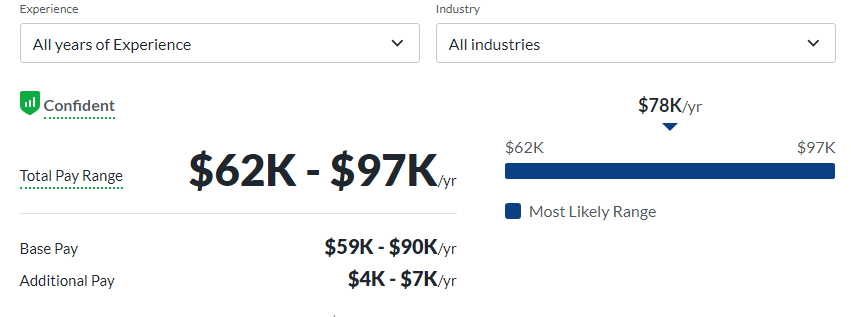
The average salary of a data analyst varies by region and experience, but in the US, they earn between $62K and $97K.
Career Growth Path
You can advance to a senior or lead analyst position when you gain more experience and expertise as a data analyst. After that, many move on to specialized roles like data scientists. If you want to go the entrepreneurial route, you can leverage your analytical expertise to transition into consulting roles.
Information Security Analyst
Information security analysts work behind the scenes to make sure that an organization’s digital assets are protected from breaches and cyber attacks. They constantly monitor networks for suspicious activity and update software with the latest security measures.
While many might see them primarily as defenders against external threats, they also play an important role internally. They help create a culture of security awareness among the members of an organization by training staff and collaborating with different departments.
Skills & Tools
Security analysts need to understand network configurations, operating systems, and encryption techniques. They always rely on software solutions to help them. This includes intrusion detection systems like Snort, vulnerability scanning tools like Nessus, and advanced cybersecurity platforms like Splunk.
Average Salary
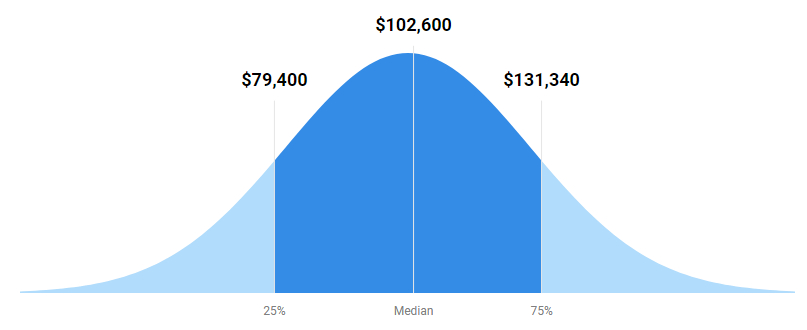
An information security analyst earns a median salary of $102,600 per year.
Career Growth Path
Information security analysts can aspire to roles such as security engineer, security architect, or even Chief Information Security Officer (CISO) of an organization. Beyond vertical growth, the skills you develop can also lead you to specialized paths like penetration testing, cyber threat intelligence, or security consultancy.
Statistician
A statistician is, first and foremost, an expert in data. They can extract meaningful insights from complex datasets. With their expertise, statisticians provide valuable input into the decision-making process, whether predicting future market trends, assessing the efficacy of a new drug, or shaping public policies.
Skills & Tools
Statisticians need a solid foundation in mathematics and statistical theory and proficiency in programming languages such as R, Python, or MATLAB. For data analysis, statisticians use software like SPSS or SAS. R or Python’s statistical libraries are often helpful for more specialized tasks.
Average Salary

Statisticians can earn an average salary of $97,535 annually, depending on their expertise.
Career Growth Path
As a statistician, you can gravitate towards senior data roles, perhaps even branching into specialized areas like biostatistics or econometrics, or you can transition into academia and share your knowledge with others.
Data Scientist
While data analysts make sense of the data they’re collecting, data scientists work to find new ways to capture that data. They design data modeling processes to create algorithms and predictive models and apply advanced machine learning techniques to gather insights from the data they’re collecting.
Skills & Tools
Data scientists need extensive machine learning, statistics, and data mining knowledge. They use platforms like TensorFlow or PyTorch for deep learning. When coding, they use Jupyter Notebooks, RStuido, or similar IDEs (Integrated Development Environments).
Average Salary
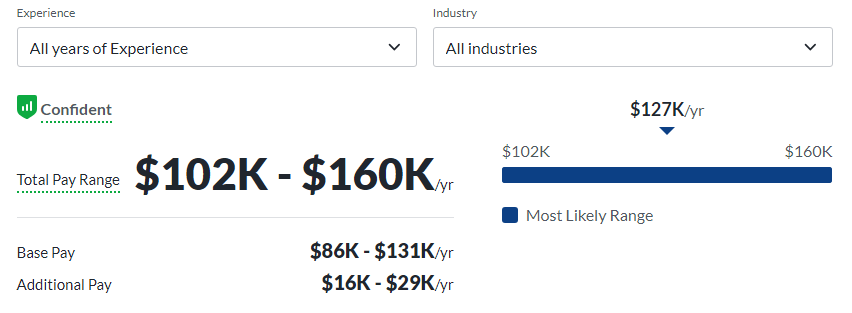
In the US, the average salary of a data scientist is $106,383 per year.
Career Growth Path
From an entry-level data scientist, the progression can lead to senior or lead data scientist roles. With time and experience, you could aspire to roles like chief data officer or director of data science.
Business Intelligence Analyst
Business intelligence analysts need to stay up to date with any market trends to assist in strategic business planning. Often collaborating with stakeholders, they design, develop, and maintain BI dashboards and reports. They recommend process improvements throughout a project and base their advice on data-driven insights.
Skills & Tools
From a technical perspective, business intelligence analysts need proficiency in SQL for database querying and a strong understanding of data warehousing concepts. For more experienced business intelligence analysts, proficiency in statistical methods and analysis is of even greater importance.
Average Salary

The average salary of a BI Analyst is around $125,209 per year.
Career Growth Path
The analytical skills you develop as a business intelligence analyst can pave the way for roles such as senior business intelligence analyst, business intelligence manager, or director of business intelligence.
Data Assurance Analyst
A data assurance analyst must ensure an organization’s data remains accurate and reliable. They implement measures to detect and rectify errors, and their roles extend beyond quality control—to education, strategy, or policy-setting.
Skills & Tools
Knowledge of data regulations and compliance, such as GDPR or CCPA, is essential, depending on the industry. In terms of tools, data assurance analysts frequently use data quality software like Informatica Data Quality, Talend, or IBM InfoSphere QualityStage to help them with data profiling, integration, validation, and cleansing.
Average Salary
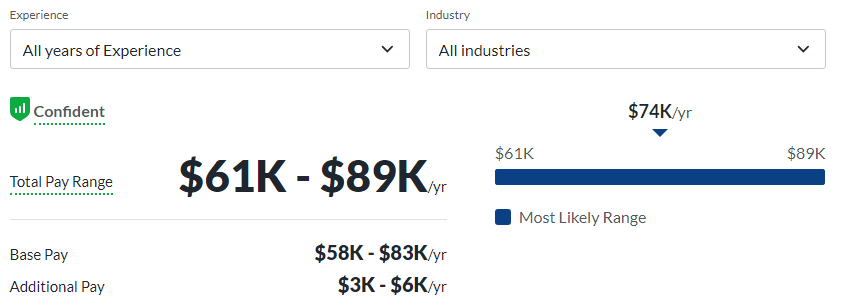
A data assurance analyst earns an average salary of $73,540 per year.
Career Growth Path
Given the emphasis on data-driven strategies, you have the potential to transition to broader roles in data analytics or data governance. However, roles to pursue as a data assurance analyst include senior data assurance analyst or data quality manager.
Data Quality Analyst
A data quality analyst has similar responsibilities to that of a data assurance analyst. They must be proactive and set and maintain the gold standard for data. From monitoring data imports to guiding teams on best data management practices, their influence spans the entirety of the data lifecycle.
Skills & Tools
Data quality analysts use tools like Informatica or Trillium to assess and improve data quality. They need a strong understanding of data profiling and cleansing and should have knowledge of SQL for querying and data manipulation.
Average Salary
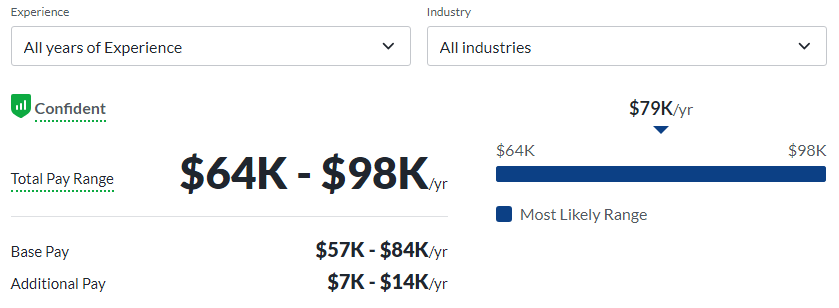
The average salary for a data quality analyst is $78,902 per year.
Career Growth Path
If you want to progress in your career as a data quality analyst, you can explore roles such as senior data quality analyst or data scientist. As virtually all businesses need to analyze and make sense of data, you can branch out into different industries.
Financial Data Analyst
A financial data analyst is essential in making business decisions, including forecasting future trends and generating detailed financial reports. The financial data analyst ensures that a company’s monetary decisions are always informed, strategic, and forward-looking, whether assessing potential investments or collaborating closely with the finance team on budgetary matters.
Skills & Tools
Financial data analysts are proficient in statistical analysis and understand financial principles. They should be able to use spreadsheet software—including knowledge of complex formulas—and be familiar with SQL, which can be a significant advantage for database querying.
Average Salary

On average, financial data analysts earn $80,764 per year.
Career Growth Path
Choosing a path as a financial data analyst can open tons of doors for you in the finance industry. With experience, you can progress to roles like senior financial analyst or financial data manager. Positions such as director of financial planning and analysis or even chief financial officer (CFO) are achievable targets.
Marketing Data Analyst
Marketing data analysts have various responsibilities within the marketing department, including but not limited to tracking digital campaigns, forecasting sales, and analyzing customer behavior. They often study how customers interact with brands and design and analyze A/B testing experiments to determine the effectiveness of different marketing strategies.
Skills & Tools
To perform the above tasks, depending on the experience of the marketing data analyst, they might use various tools and techniques. They often work with analytical platforms like Google Analytics and tools for A/B testing like Optimizely. They might also work with CRM platforms, SQL databases, and marketing automation tools, transitioning between them to gather and analyze data.
Average Salary
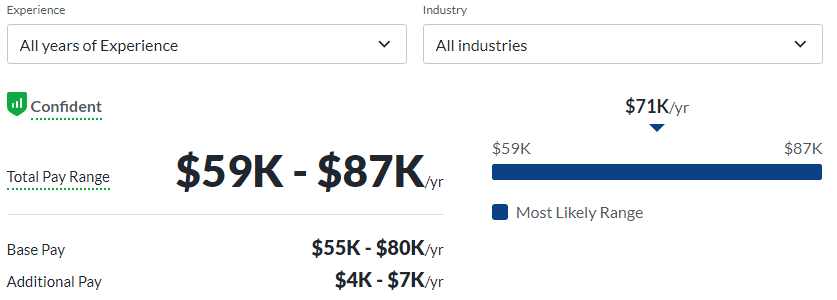
Depending on their industry, marketing data analysts can earn an average salary of $71,342 yearly.
Career Growth Path
Marketing data analysts have a variety of options when it comes to career progression. Besides advancing to managers or CMOs, they can also start their own consultancy business or explore related careers, such as CRO specialists.
Sales Data Analyst
Within sales, a sales data analyst collaborates closely with marketing data analysts to predict future sales volumes and revenue and classify customers into distinct categories based on purchasing behavior.
They also monitor and evaluate the performances of sales reps against set targets. If any areas require improvement, they work with the sales team to offer them data-driven feedback and suggestions.
Skills & Tools
Familiarity with CRM systems like Salesforce or HubSpot is essential in this role. Sales data analysts also need proficiency in data visualization tools such as Tableau or Power BI and a good grasp of spreadsheet software. Advanced analysts also utilize programming languages like Python or R for more complex analyses.
Average Salary
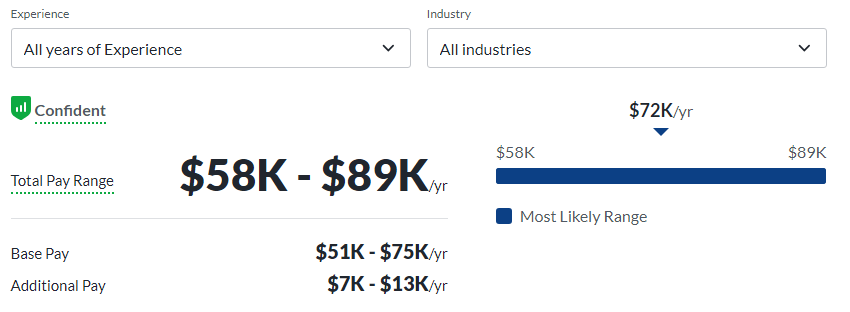
The average salary of a sales data analyst is $71,620 per year.
Career Growth Path
In such a competitive field, sales data analysts often need a proven track record to get roles such as director of sales operations or VP of sales analytics. Each promotion offers a broader scope of responsibility but is highly rewarding, as sales data analysts almost always earn bonuses or commissions.
Healthcare Data Analyst
Data analysts operating in the healthcare industry have a variety of roles and responsibilities. They mainly harness the power of data to improve patient outcomes and streamline healthcare professionals’ day-to-day operations. Their responsibilities include ensuring healthcare institutions comply with regulations, optimizing EHR systems, and keeping an eye on the financials.
Skills & Tools
Becoming a healthcare data analyst requires you to have a combination of technical proficiency and domain-specific knowledge. You need a strong familiarity with healthcare regulations and processes. Soft skills, like communication and teamwork, are invaluable, given the collaborative nature of the role.
Key tools in a healthcare data analyst’s arsenal include specialized software tailored for the healthcare industry, such as EHR systems like Epic or Cerner.
Average Salary
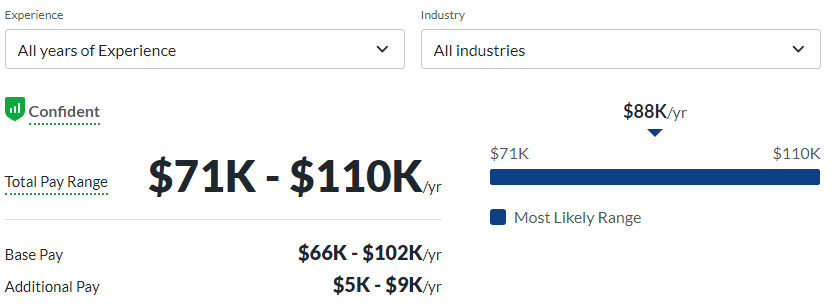
Healthcare data analysts earn an average salary of $88,107 per year.
Career Growth Path
With a few specialized certifications under your belt and years of experience as a healthcare data analyst, you can become a manager of data science at a healthcare organization. You could also work as a consultant with healthcare institutions if you’ve made enough connections throughout the years.
Operations Analyst
An operations analyst represents the connection between data and business processes. They need to make sure an organization runs as smoothly and efficiently as possible by creating processes and helping team members avoid inefficiencies and bottlenecks. They keep a vigilant eye on performance metrics and understand the nuances of various departments.
Skills & Tools
To be a successful operations analyst, you need strong analytical skills complemented by attention to detail and proficiency in various technical skills such as data visualization, statistical analysis, and an understanding of operational principles.
You will rely on tools like Microsoft Excel and SQL but also need familiarity with process mapping tools such as Microsoft Visio.
Average Salary
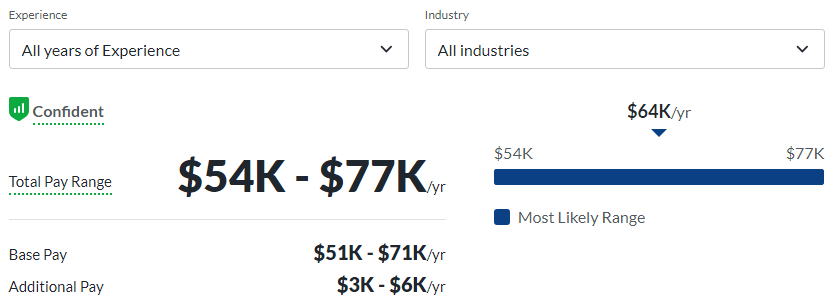
An operations analyst earns an average salary of $64,317 per year.
Career Growth Path
A senior operations analyst or operations manager may aspire to positions that require increased responsibilities, including strategic planning and higher-level decision-making. As you climb the corporate ladder, you can reach positions such as director of operations or chief operating officer (COO).
Data Visualization Specialist
Data visualization specialists turn complex data sets into visually appealing narratives. When raw data is overwhelming, they sift through vast amounts of information and craft a visual story understandable by both technical and non-technical stakeholders.
Skills & Tools
Besides the obvious foundation in statistics and data analysis, data visualization specialists also need knowledge of design principles, color theory, and graphic design. They use tools such as Tableau, Power BI, D3.js, and Adobe Illustrator. Basic knowledge of programming languages, especially those related to web development like HTML, CSS, and JavaScript, can also be advantageous.
Average Salary

The average salary of a data visualization specialist is around $79,141 per year.
Career Growth Path
Often transitioning from a previous graphic design-related career, data visualization specialists have many transferable skills. They can progress to roles such as senior data visualization designer or visualization lead, where they’ll have more influence over projects and potentially lead a team.
Machine Learning Engineer
One of the most sought-after roles in the tech industry today, machine learning engineers craft intelligent systems and algorithms capable of learning from and making data-based decisions. They develop models to process, predict, and analyze data with minimal human intervention.
Skills & Tools
A machine learning engineer needs a deep understanding of algorithms, statistics, and mathematics and knowledge of programming languages such as Python, R, or Java, with Python being the most popular. They master frameworks and libraries like TensorFlow, Keras, PyTorch, and Scikit-learn.
Average Salary
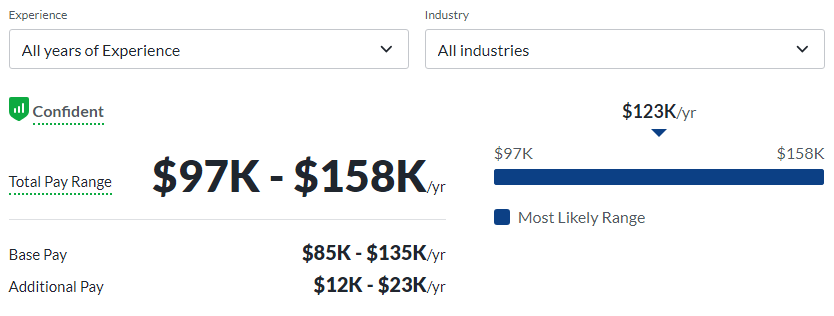
A machine learning engineer earns an average salary of $123,129 per year.
Career Growth Path
In addition to taking on increased responsibilities and overseeing large teams, machine learning engineers may progress to become senior machine learning engineers or lead machine learning engineers. In addition to engineering, it is possible to transition into research-focused roles, such as chief data scientist or machine learning researcher.
Big Data Engineer/Architect
Big data engineers and architects are tech-savvy and responsible for creating the blueprints of big data systems and overseeing their implementations. They integrate disparate data sources and use data integration tools to make sure that data flows seamlessly through the pipelines they’ve built. They also provide solutions for streaming massive amounts of data.
Skills & Tools
To excel as a big data engineer/architect, you need a deep understanding of databases and big data technologies such as Hadoop, Spark, and NoSQL. Mastery of languages like Java, Python, and Scala is essential due to their extensive use in big data technologies. Knowledge of ETL tools like Apache Nifi or Talend and data warehousing solutions can also give you an advantage.
Average Salary
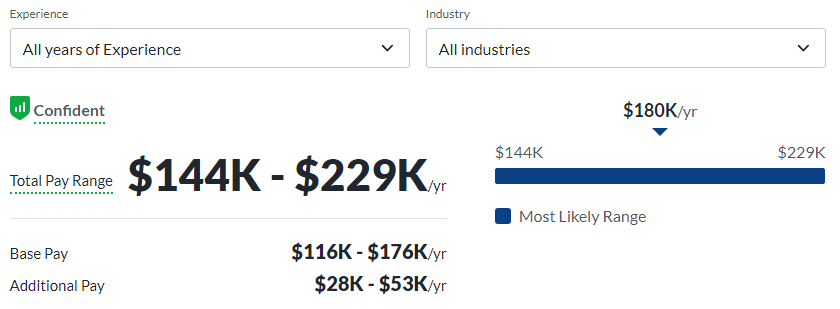
Big data engineers/architects generally earn an average salary of $180,211 per year.
Career Growth Path
As a big data engineer or architect, you have already taken a significant step forward in your career. You may advance to a position like senior big data architect or chief data officer as you gain expertise and experience.
Get To Know Other Data Analytics Students
Jo Liu
App Quality Analyst at Snap Inc.
Nelson Borges
Insights Analyst at LinkedIn
Joel Antolijao
Data Analyst at FanDuel
Skills Every Data Analyst Will Need
Regardless of an analyst’s path, every aspiring analyst must possess a core set of skills.
First and foremost, you need statistical analysis skills to discern patterns, identify anomalies, and make informed predictions from vast datasets. Statistical know-how and proficiency in programming languages such as Python or R is also needed.
In addition to the technical foundation, it is also important to be able to communicate findings. This is where the soft skill of effective communication comes into play. As a data analyst, you’ll often find yourself in the middle of technical experts and non-technical stakeholders. Bridging this gap requires a talent for translating complex data-driven insights into actionable recommendations.
Data Analyst Career Paths: Where To Start
Depending on your experience level or the industry you come from, there are a few starting points that you can follow to pursue a career in data analytics. In this section, we look at some steps you can take based on where you currently stand.
You’re Just Getting Into Data
If you’re a newcomer to the world of data analytics, begin by arming yourself with foundational knowledge on online platforms such as Coursera, edX, and Udemy.
For those who thrive in structured learning environments, try enrolling in a data analytics bootcamp, such as Springboard’s Data Analytics Bootcamp. These intensive programs can fast-track your skills in a few months and at a fraction of the cost of a traditional degree.
At the same time, don’t be scared to get your hands dirty with real data. Platforms like Kaggle offer datasets and challenges that allow you to apply and hone your budding skills practically.
You’ve Got Direct Experience
With direct experience—perhaps from roles in business analytics or from routinely wrestling with Excel formulas—you’re already a step ahead in the data game. Leverage your existing know-how by focusing on expanding your skill set to include more advanced tools and techniques. Extend your knowledge of programming languages such as Python or R to automate tasks to handle larger datasets, and try to master data visualization tools.
Remember to constantly update your portfolio with complex projects as you move along.
You’ve Got Indirect Experience
Possessing indirect experience, say from roles where data wasn’t your primary focus, but you still interacted with it, offers a unique advantage. Your understanding of business contexts or industry-specific challenges is a great asset.
Start by identifying gaps in your technical knowledge and address them through online data analytics courses or workshops. Network with data professionals in your industry, as their insights can guide you on which skills are most sought after.
FAQs About Pursuing a Career in Data
We answer your most frequently asked questions.
What Is the Difference Between a Data Scientist and a Data Analyst?
Both data scientists and data analysts work with data. But while a data analyst focuses on interpreting data to provide actionable insights, a data scientist not only analyzes data but also uses advanced statistical techniques (including machine learning) to find new ways of capturing that data.
Do You Need a Degree To Get Into Data Analytics?
A degree is not required to break into data analytics. The field values practical skills and real-world problem-solving abilities. Many successful data professionals have transitioned from diverse backgrounds through online courses, bootcamps, workshops, and self-study.
Which Industries Hire the Most Data Professionals?
The tech sector is at the forefront, with giants like Google, Amazon, and Facebook constantly hiring. The finance, banking, healthcare, e-commerce, and retail sectors also rely extensively on data analytics.
How Do Roles Like Machine Learning Engineer and Big Data Engineer Fit Into the Data Analytics Landscape?
The titles of machine learning engineer or big data engineer are specialized roles within the broader data analytics ecosystem. A machine learning engineer focuses on designing, implementing, and deploying machine learning models that can learn and make decisions from data. In many ways, their work overlaps with data scientists but with a heavier emphasis on the engineering and deployment aspects. Meanwhile, big data engineers are responsible for designing, maintaining, and enabling large-scale processing systems to make data accessible to analysts and scientists.
Since you’re here…
Interested in a career in data analytics? You will be after scanning this data analytics salary guide. When you’re serious about getting a job, look into our 40-hour Intro to Data Analytics Course for total beginners, or our mentor-led Data Analytics Bootcamp.






